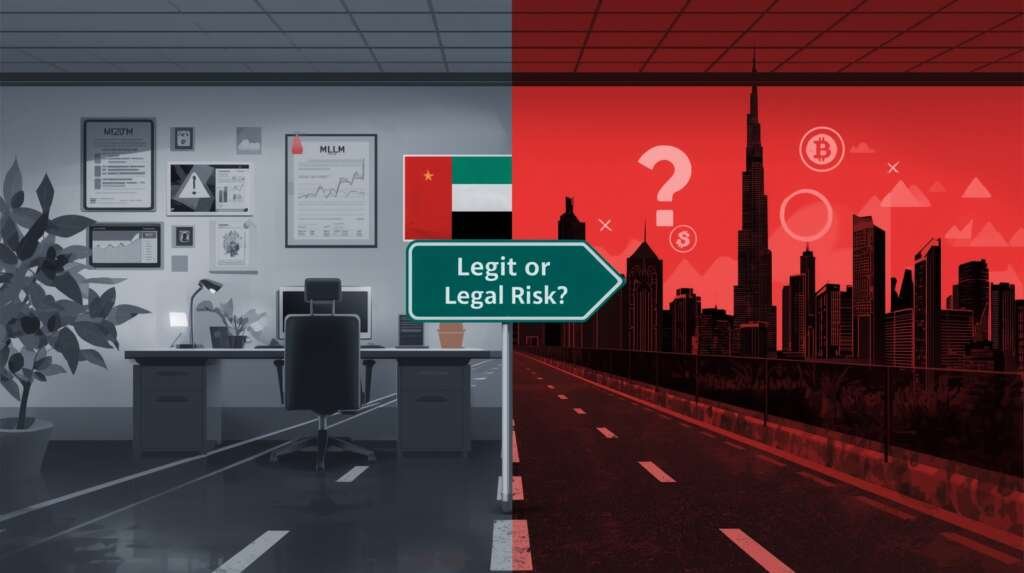The rise of affiliate marketing and multi-level marketing (MLM) has introduced new revenue streams for individuals and businesses globally. Yet, as these models gain traction, so too does the need for a robust regulatory framework—particularly in regions like the United Arab Emirates (UAE), where financial transparency, consumer protection, and regulatory enforcement are paramount.
This article explores the legal, financial, and compliance landscape surrounding affiliate and MLM programs in the UAE. Whether you’re a business owner, influencer, or marketing executive, understanding the boundaries of lawful promotion and consumer engagement is critical to avoid regulatory risks.
Understanding Affiliate Marketing and MLM Structures
Affiliate marketing is a performance-based advertising model where individuals (affiliates) earn commissions for directing sales or traffic to a company’s products or services, usually through referral links, social media, or dedicated landing pages.
Multi-Level Marketing (MLM), on the other hand, involves a hierarchical compensation structure where participants earn income not just from direct sales, but also from the sales made by people they recruit into the program. This layered commission model creates what is often referred to as a “downline.”
While both models are legal in many jurisdictions, they can become problematic when they start to resemble pyramid schemes—programs in which compensation is primarily derived from recruitment rather than actual product sales.
UAE Legal Framework: Oversight and Enforcement
In the UAE, commercial activities are subject to the oversight of several federal and emirate-level authorities, including:
- The Ministry of Economy
- The Department of Economic Development (DED)
- The Central Bank of the UAE (CBUAE)
- The Securities and Commodities Authority (SCA)
- The Dubai Virtual Assets Regulatory Authority (VARA), where digital assets are involved
These regulators maintain a strong emphasis on consumer protection, financial stability, and anti-fraud measures. While affiliate and MLM programs are not explicitly prohibited, their structure, marketing language, and financial promises must comply with various applicable laws.
The UAE Penal Code (Federal Decree-Law No. 31 of 2021) criminalizes pyramid and Ponzi schemes, as well as misleading commercial practices. Article 451 of the Code penalizes anyone who promotes or operates a scheme that fraudulently extracts funds from the public under the promise of high returns without genuine economic activity.
In addition, the UAE Consumer Protection Law (Federal Law No. 15 of 2020) and related implementing regulations prohibit misleading advertising and enforce transparency in commercial promotions.
Key Risk Factors in Affiliate and MLM Promotions
One of the major risks in running an affiliate or MLM campaign in the UAE is regulatory overreach. Many promoters do not realize that activities carried out online, especially those accessible to UAE residents or promoted by UAE-based individuals, may fall under UAE jurisdiction—even if the company is registered offshore.
Authorities may intervene or launch investigations in response to:
- Promises of guaranteed or excessive returns
- Unlicensed marketing of financial products or virtual assets
- Lack of disclosure about risks, fees, or the real nature of the investment
- Absence of a legal business license to promote such models
- Use of influencer marketing without appropriate registration or disclaimers
The Central Bank of the UAE has repeatedly warned consumers about unregulated investment platforms, and VARA has recently expanded its jurisdiction over digital asset promotions in Dubai. Companies promoting tokens, staking schemes, or DeFi-related offerings via affiliate links or MLM-like systems are especially exposed to enforcement action if not properly authorized.
Social Media and Influencer Marketing Scrutiny
The UAE’s National Media Council (now the Media Regulatory Office under the Ministry of Culture and Youth) mandates that any individual or entity promoting products or services online for monetary compensation must hold a valid e-media license. Influencers who participate in affiliate or MLM programs and receive commissions for promotions may fall under this licensing requirement.
Failure to disclose material connections—such as earning a commission from a link—can also be considered misleading under UAE consumer protection laws. This extends to TikTok, Instagram, YouTube, and Telegram-based marketing channels, where influencers often use coded language to avoid regulatory scrutiny.
Regulators increasingly monitor these platforms, and multiple fines have been issued to influencers and brands alike for unlawful promotions, including unlicensed digital assets and pyramid-style earnings programs.
VARA and Digital Asset Promotions
With Dubai positioning itself as a regulated hub for digital assets, the Virtual Assets Regulatory Authority (VARA) has implemented clear rules for marketing virtual assets. Under the VARA Marketing, Advertising, and Promotions Rulebook, any promotional activity that targets residents of Dubai or is conducted from within the city must be:
- Truthful and not misleading
- Approved by a licensed VASP (Virtual Asset Service Provider), where required
- Disclosed with appropriate risk warnings and disclaimers
- Free from exaggerated ROI claims
- Not targeting vulnerable segments with unrealistic income opportunities
This rulebook directly impacts affiliate and MLM schemes promoting crypto tokens, staking programs, passive yield platforms, and similar offerings. If such marketing originates from Dubai, or if Dubai-based individuals are involved, regulatory action may be triggered.
Even entities licensed in offshore jurisdictions like Seychelles or BVI may face scrutiny if they promote digital asset schemes in the UAE without registering with VARA or the appropriate mainland authorities.
Business Licensing Requirements
Anyone conducting commercial activities in the UAE, including affiliate and network marketing, must possess a valid trade license. This applies to individuals working as freelancers, influencers, or corporate entities.
DEDs in various Emirates issue specific licenses for “marketing services,” “network marketing,” or “electronic sales.” Operating without a valid license may result in administrative penalties, blacklisting, and suspension of local bank accounts.
For MLM structures in particular, the business model must be disclosed in full during the licensing process. Approval is granted only if the scheme demonstrates:
- Real product or service value
- Transparent pricing and returns
- No dependency on recruitment fees for income generation
- Appropriate consumer contracts and refund policies
Authorities are particularly wary of schemes that charge upfront “membership fees” without clear product delivery or those requiring mandatory purchases to qualify for commissions.
Tax and Financial Compliance Obligations
With the introduction of UAE Corporate Tax (Federal Decree-Law No. 47 of 2022), income earned through affiliate marketing and MLM models may now be subject to tax depending on the volume and structure of operations. If the annual income exceeds the AED 1 million threshold for individuals under the Corporate Tax Law’s “business activity” test, tax registration may be required.
Affiliates and MLM earners must also keep accounting records, issue tax invoices (if applicable), and potentially register for VAT if their revenue crosses the AED 375,000 threshold annually.
Additionally, funds received from offshore entities—particularly in USD or USDT—may trigger compliance red flags with local banks under Anti-Money Laundering (AML) and Combating the Financing of Terrorism (CFT) guidelines. Banks may freeze accounts or request source-of-funds documentation if the affiliate or MLM income is perceived as irregular or lacking transparency.
Avoiding Pyramid Scheme Designations
A key legal concern with MLM models is the risk of being labeled a pyramid scheme, which is illegal in the UAE. The hallmark of a pyramid scheme is when compensation is largely based on recruitment rather than actual product sales.
Red flags include:
- High joining fees with no product
- Compulsory buying of inventory
- Overemphasis on recruitment rather than sales
- Lack of retail customer sales (i.e., sales to non-members)
- Reward systems that incentivize downline expansion more than actual turnover
To avoid regulatory action, MLM promoters must focus on selling real value to real consumers and avoid marketing language that prioritizes recruitment or passive income claims.
Regulatory Actions and Precedents
In recent years, UAE authorities have cracked down on various Ponzi and pyramid schemes operating under the guise of investment platforms, crypto projects, or network marketing companies. In several cases, fines have been issued, operations shut down, and operators prosecuted.
In 2022, the Abu Dhabi Department of Economic Development issued warnings to residents about engaging with unauthorized forex and MLM platforms. Dubai authorities have also cautioned the public about social media promotions that promise unrealistically high returns.
These actions highlight the growing appetite for enforcement, particularly in an era where financial fraud is increasingly executed online, often under sophisticated branding and “influencer-backed” credibility.
Best Practices for Legal and Ethical Promotion
For businesses and individuals looking to operate affiliate or MLM programs in the UAE, compliance and transparency must be foundational. Key best practices include:
- Securing a proper trade license aligned with the nature of the promotional activity
- Registering with the Media Regulatory Office if engaging in paid promotions as an influencer
- Avoiding guarantees or unrealistic earnings claims
- Providing clear risk disclaimers and product information
- Ensuring that any crypto or virtual asset-related promotions comply with VARA’s rulebooks
- Monitoring the compliance of downline affiliates or sub-promoters
- Maintaining records of customer transactions, communications, and financial flows
Education is also critical. Many affiliates and influencers unknowingly breach UAE law due to a lack of awareness, making training and legal counsel essential for any marketing campaign targeting the UAE market.
A Transparent Future for Network Marketing
The UAE continues to solidify its position as a global business hub by fostering a regulated, transparent, and innovation-friendly ecosystem. While affiliate marketing and network marketing can be powerful growth tools, they must operate within the legal frameworks that prioritize consumer protection and financial integrity.
Regulators are not against marketing or digital entrepreneurship—but they are firm on holding all market participants accountable. For promoters, this means balancing ambition with responsibility. For consumers, it means asking the right questions before clicking a link or signing up for the next big opportunity.
In the end, sustainable success in the UAE requires more than just a compelling pitch—it demands clarity, compliance, and a commitment to doing business the right way.




